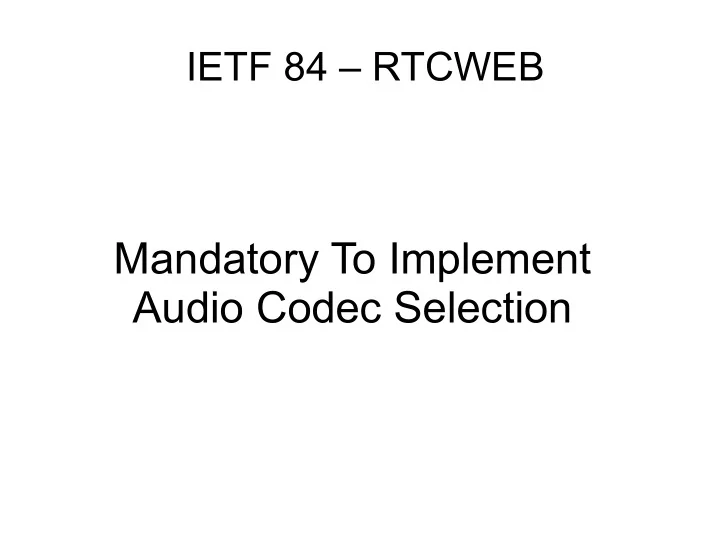

IETF 84 – RTCWEB Mandatory To Implement Audio Codec Selection
Problem Statement ● We have consensus to specify a MTI (Mandatory To Implement) audio codec – Goal: prevent negotiation failure ● Need to decide which one(s) – Fewer the better ● Not trying to decide which codecs are recommended – Implementations MAY support as many codecs as they want, but goal of MTI is to address basic interop
Criteria for Consideration ● Quality ● Versatility ● Licensing ● Standardization ● Implementations ● Deployment ● Other(s)
AMR-NB ● Quality: Good narrowband speech at low bitrates ● Versatility: Limited (narrowband only, small number of pre-defined bitrates) ● Licensing: Well-known, not royalty-free ● Standardization: 3GPP ● Implementations: Optimized implementations available, only basicops source available freely ● Deployment: Very well-deployed in mobile devices/networks (virtually all GSM, UMTS devices)
G.729 ● Quality: Acceptable narrowband speech at 8 kb/s ● Versatility: Poor (narrowband-only, one bitrate) ● Licensing: Well-known, not royalty-free ● Standardization: ITU-T ● Implementations: Optimized implementations available, only basicops source available freely ● Deployment: Lots of gateways
AMR-WB (G722.2) ● Quality: Reasonable wideband speech at 12-24 kb/s ● Versatility: Limited (wideband only, small number of pre- defined bitrates) ● Licensing: Well-known, not royalty-free ● Standardization: 3GPP & ITU-T ● Implementations: Optimized implementations available, only basicops source available freely ● Deployment: Not widely deployed – GSM Association recently finished “HD Voice” description using AMR-WB
G.722.1C / G.719 ● Quality: Good super-wideband/fullband speech starting at 48 kb/s, borderline music quality ● Versatility: Poor (super-wideband-only/fullband-only) ● Licensing: Currently royalty-free, but not open-source compatible ● Standardization: ITU-T ● Implementations: Only basicops version available freely ● Deployment: Video conferencing (Polycom, Ericsson) ● Other: Low-complexity, relatively high delay (40 ms)
AAC-LD ● Quality: Good quality stereo music at sufficiently high rates ● Versatility: Poor (fullband-only, no special speech support) ● Licensing: MPEG-LA, not royalty-free ● Standardization: MPEG ● Implementations: No freely-available implementation of any kind ● Deployment: Video conferencing
G.711 ● Quality: Poor (narrowband-only at 64 kb/s) ● Versatility: Poor (narrowband-only at 64 kb/s) ● Licensing: None ● Standardization: ITU-T ● Implementations: Trivial ● Deployment: Everywhere ● Other: Trivial complexity
Speex ● Quality: Average (slightly worse than AMR-*) ● Versatility: Narrowband and wideband, speech-only ● Licensing: Royalty-free, open-source compatible ● Standardization: None (Xiph.Org) ● Implementations: Optimized, open-source C code ● Deployment: Adobe, Apple, Google, Microsoft, Asterisk, gstreamer, etc.
G.722 ● Quality: Poor wideband at high rates ● Versatility: Poor (wideband-only, only 3 bitrates supported) ● Licensing: None (patents expired) ● Standardization: ITU-T ● Implementations: Optimized, open-source C code (as well as basicops) ● Deployment: ISDN video conferencing, desktop IP phones
iLBC ● Quality: Good narrowband speech at 13-15 kb/s ● Versatility: Poor (narrowband-only, only two bitrates supported) ● Licensing: Royalty-free, open-source compatible ● Standardization: IETF Experimental RFC ● Implementations: Optimized, open-source C code ● Deployment: Chrome, many gateways and switches
iSAC ● Quality: Okay wideband/super-wideband speech at 12-52 kb/s ● Versatility: Okay (wideband and super-wideband, adaptive bitrate, 30 and 60 ms frame sizes) ● Licensing: Royalty-free, open-source compatible ● Standardization: None (Google) ● Implementations: Optimized, open-source C code ● Deployment: Chrome, old Skype clients
Opus ● Quality: Equal or better than state of the art at vast majority of bitrates and audio bandwidths ● Versatility: Narrowband to fullband, 6-512 kb/s, mono, stereo, speech, music, arbitrary bitrates, variable frame sizes, seamless switching ● Licensing: Royalty-free, open-source compatible ● Standardization: IETF Standards-track ● Implementations: Optimized, open-source C code ● Deployment: Underway (Mozilla, Opera, Skype, Cisco, Asterisk, gstreamer, etc.) ● Other: Competitive with archival storage formats (Vorbis, AAC)
Mono Speech Quality Landscape
Proposal ● Opus – Handles all use cases – Does them as good or better than state-of-the-art – Freely implementable ● G.711 – Addresses basic legacy interoperability – ~Zero added cost to implement ● And nothing else – Sufficient to avoid negotiation failure between WebRTC end-points – Mandating more codecs won’t eliminate negotiation failure with non- WebRTC end-points
Recommend
More recommend